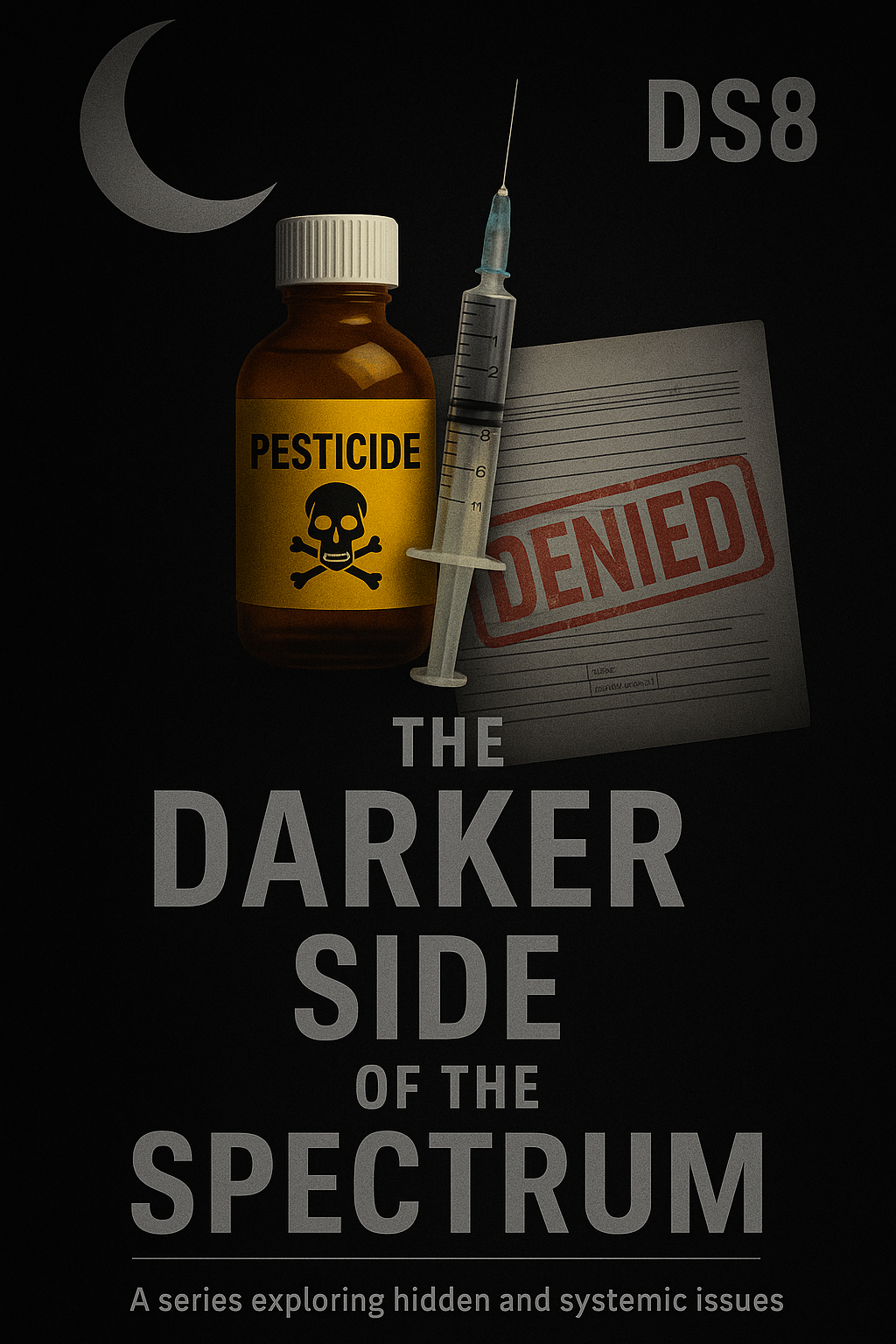🌒 The Darker Side of the Spectrum – Volume VIII
The Slow-Motion Gutting of Public Health: Three Quiet Moves You Shouldn’t Ignore
If you’ve been watching closely, it’s not hard to see what’s happening.
One by one, the mechanisms designed to protect us—from unsafe products, unnecessary care delays, and preventable outbreaks—are being disabled. Not loudly. Not all at once. But strategically, and often buried beneath 200-page bills or underreported press releases.
Let’s look at what happened just this past week. Because if you’re a parent, a caregiver, or part of the disability and chronic illness community, these aren’t abstract policy moves. They hit home.

I. mRNA Vaccine Research? Shut It Down.
On August 5, HHS announced it was winding down all mRNA vaccine development under BARDA, cancelling 22 projects and cutting ties with institutions like Emory, Tiba Biotech, and even Moderna’s academic partnerships. The full press release reads like a surgical extraction of an entire class of biomedical innovation—under the banner of “science-based” decision making. [HHS Source]
Secretary RFK Jr. stated:
“The data show these vaccines fail to protect effectively against upper respiratory infections like COVID and flu.”
Except… they don’t.
No vaccine, mRNA or otherwise, has ever promised sterilizing immunity for respiratory viruses. What mRNA vaccines did do was reduce hospitalizations, prevent deaths, and help end a global pandemic faster than any platform in history.
This isn’t course correction. It’s a strategic erasure of a technology that doesn’t fit the current narrative. And if you’re wondering how this affects our community, start with:
- Fewer tools in the toolbox for future outbreaks
- Disrupted research on rare diseases using mRNA platforms
- Greater risk for immunocompromised and disabled individuals who rely on robust public health preparedness
Who benefits when a whole field of science is scrubbed from the playbook?
Let’s be clear:
- Plaintiff Attorneys & Grifters – The same legal networks that helped make RFK Jr.’s name (and fortune) in vaccine litigation now get a ready-made “proof point” for lawsuits and fundraising.
- Biotech Competitors with Older Platforms – Traditional or whole-virus vaccine makers gain ground without having to compete with mRNA innovation.
- Ideological Actors Who Thrive on Distrust – Those whose business model is built on selling fear of “new science” now have a major win to weaponize.
- Politicians Needing a Symbolic Enemy – It’s an easy headline: “We took on Big mRNA,” without the messy reality of evidence-based policymaking.
And who loses?
Families like mine. The chronically ill. The immunocompromised. Anyone waiting for the next innovation that might save their life.
Erasing science doesn’t create safety. It just creates a void. And that void is always filled by someone else’s agenda.
II. Moms vs. Monsanto: The MAHA Movement Gets a Reality Check
In a little-noticed rider—Section 453 of a House appropriations bill—Republican lawmakers slipped in language to limit the federal government’s ability to update labeling on chemical pesticides and make it harder for families to sue pesticide companies.
This wouldn’t normally make headlines.
Except RFK Jr.’s “Make America Healthy Again” (MAHA) coalition is built on the belief that toxins—especially pesticides—are harming children, contributing to autism, and eroding trust in food systems. MAHA moms have rallied for years against glyphosate, Roundup, and corporate ag giants.
So imagine their reaction when their Republican allies—the ones they helped elect—lined up to protect the pesticide industry instead. [Bloomberg Coverage]
Zen Honeycutt, a leading MAHA activist, didn’t hold back:
“The rider cuts Bobby [RFK Jr.] not only at the knees, but at the waist.”
This is a fracture point. It shows how fast “health freedom” ideals collapse when corporate interests step in. And for families with autistic kids—many already battling chronic GI issues and environmental sensitivities—this isn’t just politics. It’s policy that says:
“We believe in clean food… until Bayer calls.”
III. HTI-4: The Fast Track to Faster Denials
Meanwhile, HHS finalized the HTI-4 Rule, an update to electronic prescribing and prior authorization systems, marketed as a way to reduce paperwork and speed up approvals.
On paper? Sounds great.
In reality? It’s a faster, more automated denial pipeline—with minimal transparency and no added patient protections.
Under the new rule:
- Providers submit prior auth requests directly from their EHR using FHIR standards
- Real-time prescription benefits appear to compare drug costs
- All this data flows instantly to insurers—who make coverage calls on the spot
What’s missing?
- Safeguards for vulnerable patients
- Accountability for inappropriate denials
- Any mention of what happens when the system gets it wrong
For the disability and autism communities, where every delay can mean regression or medical harm, this isn’t just about “efficiency.” It’s about building denial into the system itself—only faster.
Final Thought: None of This Is Random
These moves didn’t get splashy coverage. But together, they form a pattern:
- Erase a scientific platform (mRNA)
- Protect a toxic industry (pesticides)
- Streamline payer control (HTI-4)
All under the banners of “science,” “freedom,” or “efficiency.”
If you’re trying to protect vulnerable communities—disabled kids, chronically ill adults, low-income families—this isn’t the map you’d draw.
But it’s the one we’re living in now.
